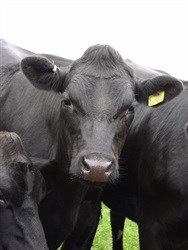Agriculture in this country faces economic obliteration by a "bio-security threat" if steps are not taken to eradicate a fast-spreading animal disease that has already cost the country R15 billion over the past three years.
Mpumalanga, Limpopo, KwaZulu-Natal and the Kruger National Park have been declared foot-and-mouth infectious zones, sending the Agriculture Department racing to vaccinate animals.
The department said 500,000 herds of cattle in the three provinces are at risk of infection.
It is not known how many cattle, goats, sheep and pigs are infected.
Although not deadly to humans or most other animals, foot-and-mouth disease is highly contagious and affects cloven-hoofed animals, including cattle, goats, sheep, pigs and buffalo.
It spreads through contact with contaminated farming equipment, vehicles and feed.
Containment of the disease requires strict monitoring, trade restrictions, quarantine and, in some instances, the mass slaughtering of animals.
Meat exports under threat again
An almost three-year trade ban on exports of South African red meat in 2011, which was lifted last year, cost this country about R15bn in lost export revenue.
But South African meat exports are under threat again as the EU and China will this month send inspection teams to South Africa to assess the success of efforts to contain and eradicate the disease, and the safety of its meat products.
"It's now or never. We have no option. We cannot lose this battle," said Minister of Agriculture, Forestry and Fisheries Senzeni Zokwana yesterday.
The World Organisation for Animal Health, the international regulating body for animal health, protection and international trade, has ordered South Africa to:
- Improve border fences with Zimbabwe;
- Demarcate protection zones around disease-free areas;
- Address critical shortages in veterinary services;
- Improve fencing around infected game reserves;
- Improve surveillance of disease-free zones;
- Separate animal products from disease-free and disease-protected zones at abattoirs; and
- Ensure the ready availability of vaccines.
South Africa has a shortage of vaccine and will import the drug from Botswana.
Mooketsa Ramasodi, chief director for inspection and quarantine services in the Department of Agriculture, said South Africa had until next week to present its plans for dealing with the outbreak to the World Organisation for Animal Health.
Serious economic implications
Zokwana said the disease could cause severe production losses.
"It spreads rapidly, making it a significant trade-restrictive disease. Outbreaks in South Africa's disease-free zones will have serious economic implications.
"It will see an immediate ban on all livestock and livestock products, and potentially bans on plants and plant products.
"The free-zone status should not be taken lightly. Our trading partners regard this as a crucial yardstick in assessing this country's veterinary services."
Zokwana said the commercial game industry was a "significant" economic contributor.
"Kruger Park's buffalo are infected, and those of adjacent game reserves. Economic losses from this industry are serious."
He said critical control measures were required to eradicate the disease and restore South Africa's free-zone status.
"Some of our facilities, such as dipping tanks, are falling apart. We are in urgent discussions with other government departments to address this ... and the borders."
Faffa Malan, of South Africa's animal health forum, said the disease was a serious "bio-security" threat to South Africa.
"It kills pigs, is debilitating to other animals and spreads like wildfire, but it does not infect humans. Countries importing our meat fear that their animals will become infected and that they will then face export bans.
"It's got nothing to do with food security. It's about economic security. In 2001, after a foot-and-mouth outbreak, UK officials slaughtered 10 million animals to halt it. But to stop the disease, you vaccinate.
"This disease is a serious economic threat to South Africa and the entire SADC. It's an emergency."











































